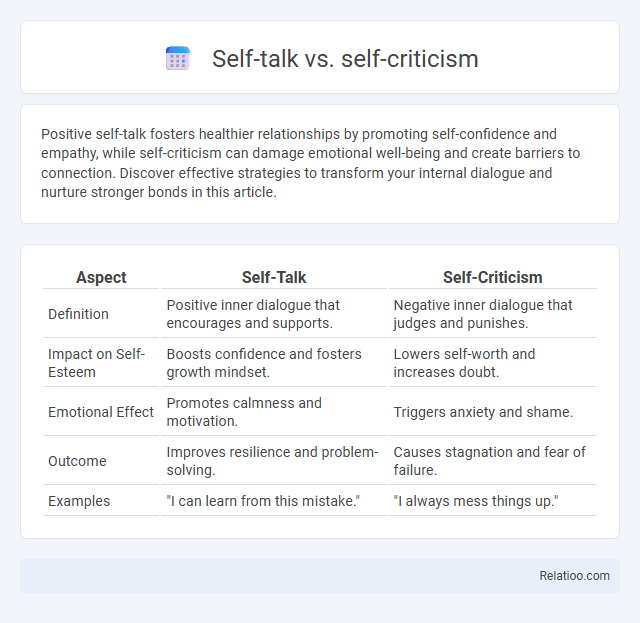Positive self-talk fosters healthier relationships by promoting self-confidence and empathy, while self-criticism can damage emotional well-being and create barriers to connection. Discover effective strategies to transform your internal dialogue and nurture stronger bonds in this article.
Table of Comparison
| Aspect | Self-Talk | Self-Criticism |
|---|---|---|
| Definition | Positive inner dialogue that encourages and supports. | Negative inner dialogue that judges and punishes. |
| Impact on Self-Esteem | Boosts confidence and fosters growth mindset. | Lowers self-worth and increases doubt. |
| Emotional Effect | Promotes calmness and motivation. | Triggers anxiety and shame. |
| Outcome | Improves resilience and problem-solving. | Causes stagnation and fear of failure. |
| Examples | "I can learn from this mistake." | "I always mess things up." |
Understanding Self-Talk and Self-Criticism
Understanding self-talk involves recognizing the internal dialogue that shapes thoughts, emotions, and behaviors, serving as a critical tool for self-regulation and motivation. Self-criticism, a specific subtype of self-talk, often manifests as negative and judgmental inner commentary that can undermine self-esteem and increase stress. Differentiating constructive self-talk from harmful self-criticism is essential for improving mental resilience and promoting positive psychological outcomes.
The Psychology Behind Inner Dialogue
Self-talk involves the internal conversations individuals have, shaping their thoughts and emotions, while self-criticism represents a negative form of self-talk that often undermines confidence and increases stress. The psychology behind inner dialogue highlights how positive self-talk can enhance motivation and well-being by promoting adaptive thinking patterns, whereas excessive self-criticism is linked to heightened risk of depression and anxiety. Research in cognitive-behavioral therapy emphasizes transforming self-critical inner dialogue into constructive self-talk as a key strategy for improving mental health outcomes.
Positive Self-Talk: Benefits for Mental Health
Positive self-talk enhances mental health by promoting resilience, reducing stress, and improving overall emotional well-being. Unlike self-criticism, which erodes self-esteem and increases anxiety, constructive self-talk fosters a supportive inner dialogue that encourages problem-solving and optimism. Scientific studies reveal that consistent positive self-talk is linked to lower depression rates and increased coping ability during challenging situations.
The Impact of Self-Criticism on Well-Being
Self-criticism significantly undermines your well-being by fostering negative emotions such as anxiety and depression, which impede mental health and overall life satisfaction. Unlike positive self-talk that promotes resilience and self-confidence, self-criticism triggers harmful self-judgment and erodes self-esteem. Reducing self-critical thoughts can enhance emotional regulation and support a healthier mindset critical for personal growth.
Self-Talk vs Self-Criticism: Key Differences
Self-talk involves the internal dialogue you use to motivate, guide, or reflect on your actions, often fostering positive thinking and resilience. In contrast, self-criticism is a harsher internal narrative emphasizing your perceived flaws and mistakes, which can undermine confidence and increase stress. Understanding the distinction between constructive self-talk and destructive self-criticism is crucial for improving mental well-being and enhancing your emotional regulation.
How Self-Talk Shapes Confidence and Motivation
Positive self-talk enhances confidence by reinforcing a growth mindset, boosting motivation through affirmations that encourage perseverance and resilience. Negative self-criticism undermines self-esteem, creating psychological barriers that decrease motivation and increase anxiety. Constructive self-talk balances realistic self-assessment with encouragement, promoting adaptive behavior and sustainable achievement.
Identifying Patterns of Self-Criticism
Identifying patterns of self-criticism involves recognizing repetitive negative inner dialogues that diminish self-esteem and hinder personal growth. Unlike constructive self-talk that promotes motivation and problem-solving, self-critical thoughts often manifest as harsh judgments and unrealistic expectations. Understanding these distinct cognitive patterns enables individuals to replace detrimental self-criticism with positive and supportive self-talk for improved mental well-being.
Transforming Negative Self-Criticism into Supportive Self-Talk
Transforming negative self-criticism into supportive self-talk involves recognizing and reshaping harsh inner judgments into encouraging and constructive messages. Your mind responds better to positive affirmations that promote self-compassion and resilience, which enhance emotional well-being and motivation. Developing a habit of supportive self-talk can reduce stress, improve confidence, and foster a healthier relationship with yourself.
Techniques to Cultivate Positive Inner Dialogue
Techniques to cultivate positive inner dialogue involve replacing self-criticism with compassionate self-talk by using affirmations, reframing negative thoughts, and practicing mindfulness to increase awareness of internal narratives. Structured exercises such as journaling positive experiences and setting realistic goals help reinforce constructive self-talk patterns. Incorporating cognitive-behavioral strategies enhances emotional resilience by challenging cognitive distortions and promoting a supportive mental environment.
Building Long-Term Resilience Through Empowering Self-Talk
Empowering self-talk fosters long-term resilience by cultivating positive internal dialogue that reinforces confidence and adaptive coping strategies. Unlike self-criticism, which undermines motivation and exacerbates stress, constructive self-talk directs attention toward growth and problem-solving, promoting sustained emotional well-being. Developing consistent patterns of empowering self-talk enhances psychological strength, enabling individuals to navigate challenges effectively and maintain mental toughness over time.

Infographic: Self-talk vs Self-criticism
 relatioo.com
relatioo.com